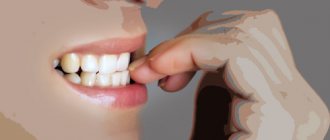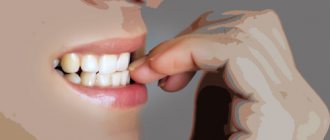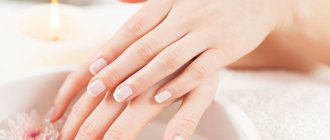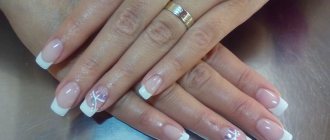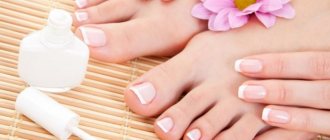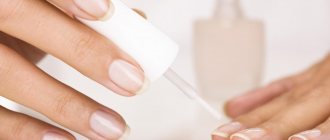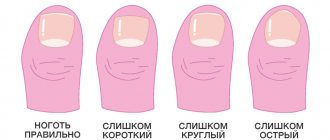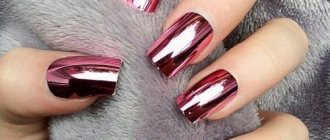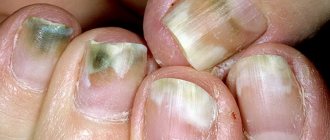The habit of biting nails is not limited to small children.
Often she remains both in adolescence and in adulthood - recently photographs of the British queen herself, caught by the paparazzi doing something inappropriate for a royal person, went viral.
The luminary of Russian poetry A.S. committed similar sins. Pushkin - Arina Rodionovna tied his hands.
And the queen of American pop, Britney Spears, a singer with a gnawed manicure, we regularly see.
And if at 10 or 11 years old you can still somehow justify this and wean the child from a bad activity, then at 30 it can significantly spoil life.
Just imagine how you apply for a job and hand over your resume with a hand with bitten nails.
It is unlikely that the employer will rush to the HR department with him, even considering the impressive list of your achievements.
Let's figure out what causes this habit and how to stop biting your fingernails at home.
Occupy your mouth
If you are not interested in new hobbies, then you should think about what you can do to occupy your mouth. Unfortunately, constant snacking is not suitable for everyone, as it can significantly affect your figure. Try chewing gum, and if you don't like it, keep mints or other candies on hand. Every time you find yourself wanting to bite your nail, eat one of the lollipops.
Over time, candy can be replaced with a bottle of water. In this case, you should take a big sip after every thought about biting your nails.
At 13 years old
It is useless to force thirteen-year-old teenagers to do anything by force and to impose your opinion and vision of the problem on them. If a girl has a bad habit, then her mom can sign her up for a manicure and ask the master to explain how to properly care for her nails.
As soon as a young girl sees the result of a professional’s work, she is unlikely to want to return her nail plates to their former poor appearance and will strive to take care of them.
As for boys, parents can give them an expander or some kind of board game so that he can occupy his hands.
Bitter nail polish
These include a special bitter varnish. This coating is not harmful to the human body, but has an extremely unpleasant taste. When applying a special varnish, try to cover not only the nail itself, but also the skin around it. You can purchase this product in cosmetic stores and pharmacies.
Any tasteless coating can become an analogue of bitter varnish. As a child, your grandmothers often scared you by smearing mustard on your nails. Instead, you can also use any product that is safe for health and has a strong taste.
How to get rid of a bad habit
Trim your nails regularly
The shorter the nail, the more difficult it is to bite.
Get a professional manicure
You will be sorry to ruin your manicure. Firstly, because it is beautiful, and secondly, because it is expensive. To give up this nasty habit, you can cover your nails with gel or acrylic: this is quite difficult to bite off.
Start taking care of one nail
Quit the habit gradually: first, forbid yourself from biting a nail, for example, on the thumb of your right hand. At first it will be difficult to remember the prohibition, but in the end you will be able to remove one finger from being chewed, and the appearance of the nail on it will certainly please you. After this, add the nail of your index finger to the number of protected objects, and so on, until the habit disappears completely.
Use special bitter-tasting coatings
There are varnishes and enamels against nail biting. These products are sold both in pharmacies and cosmetic stores.
Wear gloves or tape your nails
Drastic, but effective: in this case, you will not be able to physically reach your nails.
Watch yourself
Try to understand in what situations or in what emotional state you put your hands in your mouth. Perhaps you're triggered by an uneven nail edge or a hangnail, or maybe you're just bored or anxious. Find out the reason, and it will be much easier for you to control yourself.
Replace one habit with another
Hold something in your hands more often - squeeze an anti-stress toy, spin a spinner, roll a coin between the phalanges of your fingers, or simply click a fountain pen. Instead of nails, chew an apple or chew gum. In a word, occupy your mouth and hands with something less harmful.
Causes
Most experts believe that the main cause of onychophagia is severe stress or psychological trauma suffered in childhood. The reason for stress can be:
- conflict situation in the family;
- parental divorce;
- difficult relationships in children's environment;
- high demands on the baby that he cannot cope with;
- feeling of defenselessness, loneliness.
https://www.youtube.com/watch?v=dTQ8KVO-F80
People who suffered stress or received psychological trauma in childhood often fall into an addiction at a fairly mature age, even with a little anxiety.
In most cases, people suffering from onychophagia experience low self-esteem, self-doubt, shyness and nervousness. For such people, biting nails is one of the effective ways to get rid of anxiety. Some doctors believe that onychophagia can be inherited, that is, if you are diagnosed with onychophagia, then your children will most likely also be susceptible to this disease.
Freud wrote that onychophagia may be a consequence of dissatisfaction with the oral reflex in infancy, for example, if the baby was weaned early or very abruptly weaned off the pacifier.
For infants, the process of sucking brings a feeling of peace and protection, so its deficiency first forms the habit of thumb sucking, and subsequently a tendency to onychophagia.
The habit appears in childhood. A person carries it with him throughout his life. During times of relative psychological calm, it does not manifest itself in any way, but during stress, the hands immediately reach for the mouth. The psychosomatics of onychophagia lies only in psychological problems.
When a baby experiences psychological discomfort, he calms down in this way. At the same time, the feeling of security remains for life and is recorded in the subcortex.
Growing up, an adult unconsciously puts his hands in his mouth as soon as he experiences psychological discomfort. At this time, self-control, help from loved ones, and a conversation with a psychologist will help. It is necessary to understand the essence of the problem and work together to find a solution.
Other causes of onychophagia:
- anxiety;
- guilt;
- obsessive-compulsive disorder;
- trouble in personal space;
- problems communicating with others;
- adopting other people's habits.
Prolonged nervous tension provokes the manifestation of a forgotten bad habit. Particularly sensitive people, unstable in the face of stress, thus build a psychological defense mechanism and calm down during periods of emotional overstrain.
The process distracts a person from the current situation, helps to reflect on it, calm down, think and find the right solution. But not everyone around can understand and accept an adult who bites his nails with pleasure.
Habit
A bad habit does not appear overnight. This is a long process that develops throughout life. Over time, this becomes a reflex - a reaction to mental stimuli.
In childhood, the child is controlled by his parents; later, as he grows up, he must learn self-control. It is important to get rid of the habit as early as possible so as not to look funny and ridiculous.
An adult grows up with this habit, it becomes part of him, and it is almost impossible to eradicate it.
How to use varnish correctly
If you have determined the cause of nail biting, you can safely begin to eliminate it. In the event that this is ordinary pampering, there will be no special problems, just talking to the child is enough. However, if this is a psychological disorder, it is worth combining your chosen treatment method and using bitter varnish.
You can purchase varnish at your nearest pharmacy, cosmetic store, or order it from a special online store. Before using anti-nail biting varnish, you must read the instructions carefully and only then apply a clear, bitter liquid to the nail plate. You should not think that after several procedures you can solve the problem, because only regular use of the product will help you quickly get rid of the habit of biting your nails.
As a rule, the product must be applied several times a day, painting in two layers for two weeks. Some drugs can be used without time restrictions, which allows you to use the product until the child or adult gets rid of this bad habit. The liquid dries quickly, so the procedure will not take much of your time, and the baby will even notice much of a difference, only he may feel a bitter taste. If the child is accustomed to the bitter taste of the varnish, it is worth trying to use a varnish from another manufacturer.
Keep hand cream with you
This method is a bit similar to the candy method. Whenever you have the urge to start biting your nails, start using hand cream. This will not only distract you from the bad habit, but will also help keep your skin soft and hydrated. The hardest thing will be to catch yourself thinking that you want to start biting your nails. At first you will rarely notice this urge, but over time you will be able to pay attention to it more and more often.
A child bites his nails - reasons
According to statistics, children aged 7-10 years suffer from this habit twice as often as preschoolers. As they get older, the problem gets worse: about 45% of teenagers bite their nails. In official medicine, there are two types of pathology:
- onychophagia – habit of biting nail plates;
- dermatophagia - along with nails, children also chew cuticles.
Both the first and second conditions are provoked by a number of factors. It is important to thoroughly understand why a child bites his nails: the tactics to combat the problem depend on the identified cause. The following groups of provoking factors are distinguished:
- physiological;
- psychological;
- age.
Physiological triggers include the following factors:
- Condition of the cuticle. In some babies, the skin around the nail plates becomes very puffy. So the children are trying to cope with the problem without parental help: they nibble on the “excess”.
- Avitaminosis. The baby’s nervous system functions well provided that the child’s body receives a complex of vital elements along with food. Increased nervousness and anxiety often indicate a lack of vitamins B, E and magnesium.
- Physical pleasure. Often, this habit appears when a child is forbidden to do something that causes him pleasant emotions, for example, eating sweets.
- Parasitic lesion. Along with bitten nails, the baby experiences severe salivation and coughing. At the same time, when he is infected with worms, he is bothered by itching in the rectal area.
Psychological provoking factors include:
- constant scandals in the family;
- low self-esteem;
- anxiety;
- aggression;
- excessive loads and stress;
- experiences;
- fear.
The following age characteristics are distinguished:
- In two- to three-year-old children, this habit arises unconsciously. More often it manifests itself in cases of digestive problems, lack of vitamins and minerals, as well as parasitic infestation of the body.
- In children aged 4-5 years, nail biting is often observed during mental work. This habit helps them concentrate.
- Children aged 6-7 years are adapting to school. They have to get used to a new way of life, and all this is associated with excitement and worry.
- In children belonging to the age group of 8-11 years, the habit can be caused either by physiological or psychological problems.
Most often, the bad habit of biting nails appears due to prolonged exposure to a stressful situation. Without time to understand himself, the patient finds in this a simple method of calming down. This process is uncontrollable, so every stressful situation will be accompanied by such a behavior disorder.
The habit begins in childhood. Unable to hide or overcome negative emotions, the child begins to chew the nail plate.
Other causes of the disorder:
- Diffidence. A problem like this indicates that a person has internal conflicts. They are caused by difficulties in communicating with peers or parents, misunderstanding on the part of loved ones, unfavorable climate in the family, etc. Trying to compensate for his insecurity, the child begins to bite his nails.
- Overcoming conflicts. It happens that a child is subject to overprotection. He has no freedom of action because his parents carefully monitor his every move. Mom and dad can focus on the problem. This is how parents want to cause a feeling of shame in the baby, but this only aggravates the situation.
- Auto-aggression. Trying to calm down, some children not only bite their nails, but chew the nail plate until it bleeds. In psychology, this is considered a manifestation of masochism.
- Low self-esteem. According to statistics, obese people have this habit. Those who are dissatisfied with their own lives are susceptible to this problem.
People whose professional activities involve intellectual work or psychological stress have a bad habit. Often these are creative individuals or those who work with people and sign systems.
Another reason is that a person simply has nothing to do. Being bored, he begins to chew his nails and the skin around them.
Why do people bite their nails? If they bite until they bleed and the damage is really serious, this behavior may be a form of auto-aggression, which indicates a serious internal conflict that requires resolution. Therefore, in each case it is useful to understand yourself and answer a few questions:
- What happens in my life when I start biting my nails?
- What emotions make me bite my nails?
- In what situations do I not bite my nails?
Sometimes a small session of self-analysis can be of great help in the fight against obsessive behavior. Anyone who bites their nails unconsciously must first learn to notice this behavior and analyze the situation that causes it. After all, nail biting usually occurs without making a conscious decision, and only after a while a person notices with annoyance the consequences of his actions.
You should remember when the habit appeared and your feelings at that time. You can even keep a special diary to determine what situations and sensations provoke nail biting in order to eliminate this stress factor as much as possible and more carefully control yourself if it occurs.
It is worth noting that women can easily cope with such an addiction, although this will require significant financial investments. To get rid of this habit, you simply need to regularly visit a nail salon to get your nails done. You won't be able to bite your extended nails. According to the women themselves, this does not bring joy. Such nails can simply break and leave sloppy sharp corners.
Nail biting is, of course, a bad habit. The sources of the problem usually lie in psychological disorders. In medicine, there is even a name for such a disorder in an advanced form - onychophagia. Most often, if desired, over time you can completely get rid of such a habit. The main thing is to realize that it has a detrimental effect on your health.
Why do children and adults bite their nails?
What's interesting is that most children under six years of age never bite their nails.
This habit is formed between the ages of seven and ten and, if not overcome in time, haunts a person throughout his life.
Moreover, according to the observations of scientists, boys are guilty of self-criticism more often than girls.
The reason for this is not at all the love for a beautiful manicure of the fairer sex, but self-doubt, stress, nervous and physical strain, aggression, and anger.
Strong emotions make us bite our nails
Professional psychologists called this habit “onychophagy” and consider it a symptom of obsessive-compulsive mental disorder - increased anxiety was found in 100% of people over 27 years of age.
Let's also add low self-esteem and a tendency to self-digging.
Moreover, the more a person bites his nails, the more he wants to do it - the sight of an unaesthetic manicure makes him scold and hate himself for his inability to resist weaknesses.
Let's add physical harm to psychological harm:
- Bacteria accumulate under overgrown nail plates. The more often you put your fingers in your mouth, the more likely you are to develop an intestinal disorder.
- If you regularly chew on the beautiful shape of your nails, you can’t dream of it; burrs endlessly form around the plates, and biting them ends in inflammation.
- A terrible habit results in problems with teeth - cracked enamel, inflammation of the gums and oral cavity, and actual loss of teeth (need I remind you that, unlike hair, they do not grow back on their own?).
Well, it’s not worth talking about how terrible nail biting looks from the outside and offends those around you.
Therefore, we begin to fight the deficiency in all possible ways.
The problem is psychological in nature
What is onychophagia?
Onychophagia should be considered not just a bad habit , but a mental disorder, since it has a code in the ICD.
It often accompanies many mental illnesses , such as:
- neurosis,
- depression,
- anxiety disorder
- obsessive-compulsive disorder,
- phobic disorder.
Children who regularly face stressful situations or experience increased mental, physical or psychological stress tend to bite their nails.
Most often, onychophagia is observed in children from four to six to fifteen years old . 35% of school-age children bite their nails. There are also many onychophages among adults.
Dangers of onychophagia:
- A child’s nails look unsightly and may become deformed (the nail plate can change shape, grooves and tubercles appear on its surface).
- If gnawing affects the skin around the fingers, bleeding and areas of inflammation may occur. However, the pain does not stop some onychophagous children: they can continue to bite their skin and nails, which leads to the appearance of permanent inflammatory foci. If the child’s immune defense is extremely weakened (for example, this happens after long courses of antibiotic therapy, during and after chemotherapy, radiation therapy, with leukemia, HIV infection, but only if the level of leukocytes is insufficient), wounds may become infected, fester, up to the development of serious purulent lesions. Wound infections can also occur in relatively healthy children, but the likelihood is much lower.
Onychophagia may indicate the presence of much more serious mental illnesses that should be paid attention to.
However, many parents do not attach any importance to the fact that the child bites his nails, or decide that the best way to “treat” is to hit them on the wrist.
Such an attitude towards the problem only leads to a significant worsening of the child’s mental well-being.
Children 3-4 years of age and older with onychophagia may experience the following symptoms:
- loss or deterioration of appetite,
- various sleep disorders (insomnia, uneven, excessively sensitive sleep, periodic awakenings, daytime sleepiness),
- irritability,
- nervous tics,
- depression,
- loss or decrease in interest in activities that were important before,
- deterioration in academic performance,
- problems with attention, concentration,
- diffidence.
This mental disorder can worsen during times of severe stress, after psycho-emotional shocks.
For example, a child may begin to bite his nails more often and more severely during exam periods, during the divorce of his parents, or after the death of a loved one.
Wear a rubber band on your wrist
There are two ways to stop biting your nails using an elastic band. Buy a regular rubber band for money and put it on your hand. Set yourself a goal of not biting your nails for a month (or whatever time period suits you best). As soon as you break down and start biting your nails, put the same rubber band on your other hand and start counting again.
Another way: when you have the urge to start biting your nails, pull the rubber band back a little and let it go so that it hits your skin. The blow will not be very painful, but gradually the brain will connect the thought of biting nails and subsequent pain, which means that over time the desire to bite nails will decrease.
How to get rid of the habit of biting your nails?
- If you notice that your baby is biting the nails on his little hands, you should never hit his hands. It is necessary to understand the reason why a child bites his nails, and try to occupy the child’s hands with useful activities that calm and distract. You can color a picture together or put together a mosaic.
- Girls who bite their nails can be offered a beautiful children's manicure. They will be proud of it and will not spoil it. You can also recommend covering your nails with varnish, which is produced to prevent nail biting. It has a bitter taste. You can buy varnish at a pharmacy.
- People who bite their nails are advised to regularly trim their nails short to avoid the temptation to chew that treasured tip.
How to stop biting fingernails as an adult - psychological tricks
Before smearing your nails with agave or sprinkling mustard, let’s figure out how psychology can be useful.
And if you are still confident that creating a manicure using your own teeth helps you concentrate and make the right decision in a difficult situation, then in fact you are simply in a state of permanent stress.
You need to fight not so much the habit as the cause - worries, bad mood, nervous breakdowns. Ideally, the right solution would be to see a psychotherapist.
Working on your own consciousness will help you cope with the problem.
You can arrange “home therapy” for yourself in the following ways:
"No" to negativity
Learn to drive away bad thoughts and control emotions - do not replay the mistakes of the past day, week or year in your memory, concentrate on the good, praise yourself, keep a diary of joyful memories, add even small positives there.
"No" to anxiety
When bad thoughts begin to overwhelm you, say out loud all your actions: now I’ll make myself some tea, watch my favorite show, go for a walk, bite my nails.
As soon as you say this out loud, you will immediately stop yourself. After 7-10 times of regular practice, a conditioned reflex will begin to develop.
Cover the plates with a special varnish
"Yes" to vitamins
To strengthen your nervous system, take care of not only psychological, but also physical health - eat right.
Eat more vegetables and fruits, take a course of vitamins. The latter quickly strengthen the nail plates and accelerate their growth.
“Yes” to what you love
Pay more attention to hobbies - when you draw, dance, embroider or bake cupcakes, the desire to bite your nails disappears by itself, because your head is occupied with other thoughts.
Supplement psychological techniques with physiological ones:
- Get a beautiful, expensive manicure , and the desire to ruin it will disappear along with the desire to bite your nail plates; if you are a girl, cover the plates with gel polish or strengthen/build them up.
- Find an adequate substitute and try chewing on something else— for example, a toothpick, chewing gum, or buying candy. As a last resort, use a pencil.
- To avoid a relapse, scrub the soap - the unpleasant aftertaste will discourage you from touching your nails with your teeth for a while.
- If your main problem is hangnails, carry nail scissors with you to carefully trim the skin if necessary.
- Allow yourself to be a child and smear your nails with something bitter/spicy - aloe juice, red hot pepper, dry mustard, onion juice, wormwood tincture will do.
- Cover the plates with a special strengthening varnish (these have been sold in pharmacies for a long time, since pharmacology has taken care of those who like to do manicures with their teeth) - its unpleasant taste will discourage the desire to bite nails.
- Don’t forget to motivate yourself and pay attention to the beautiful manicures of those around you. The desire to have one will definitely one day overcome the passion for gnawing.
- As a last resort, cut your nails as short as possible - the shorter they are, the harder it is to bite them.
Spend more time on your hobbies
Advice: psychologists say that a bad habit can indicate unfulfilled sexual desires. Work on this side of the issue.
The process of eating nails is especially active while watching TV, so find a more edible replacement for them - popcorn, seeds, straws.
And start working on your consciousness - that’s where you will discover the roots of the problem.
How to stop a child from biting his nails?
While an adult still understands the danger of the situation, it is not always easy to deal with children. What to do if a child bites his nails? In such a situation, you can also use both psychology and special coatings.
Psychological approach
In this case, all the influence on the child’s psyche comes from his parents, and therefore it is they who must develop the following habits for themselves and their baby:
- Under no circumstances should you express your dissatisfaction with his behavior in an aggressive manner, i.e. scream and hit hands.
- Talk to your daughter or son more often, carefully learning about his problems and worries, thereby calming him down and giving him a feeling of security.
- Parents themselves are responsible for taking care of their hands, while at the same time teaching their child the basic skills of caring for them.
- Children can also be distracted from the habit of biting their nails during all sorts of activities that require their hands (crafts, drawing, playing with construction sets).
- An excellent option would be a fairy tale of your own composition, in which 2 opposing heroes are compared. Their difference lies in the condition of the marigolds, and the result is the presence or absence of friends.
In the most severe cases, a visit to a professional psychologist will be mandatory.
Application of cosmetics
Children are also well suited for the nail coatings already mentioned in the material - varnishes, oils and wax. But you can’t limit yourself to just them. As already mentioned, often the problem is vitamin deficiency, so taking vitamins and minerals is not a bad idea, especially in the winter and spring. To make it easier for your baby to control himself, you can give him soothing herbal teas or medications of natural origin.
Video “How to stop a child from biting his nails”
The video presents the most effective ways to solve this problem in children, according to experts.
Recommendations from experts
As Dr. Komarovsky says, a child bites his nails without even thinking about what he is doing and the consequences. The process develops into a habit gradually and does not go away over the years. That is why the problem must be taken seriously.
The child must know and understand why his mom and dad are so concerned about him biting his nails. Therefore, you need to explain this to him, but only in a calm manner. If you yell at him, he will stop doing it, but only in front of his parents. According to the same Komarovsky, there is no point in smearing your nails with tasteless mustard or intimidating your child with scary stories. Sometimes such actions lead to the fact that he begins, for example, to bite his lips instead of nails.
The best solution would be to review the child's daily routine. It is necessary to devote as much time as possible to him, communicate with him, spend more time in the fresh air, give a soothing massage and limit the use of a computer and other equipment to a minimum. At the same time, it will be useful to conduct games and activities for concentration.
Keep your hands busy with your phone
Oddly enough, but this method really helps. This works especially well with large phone models that are not easy to hold with one hand. If your smartphone is a little smaller, install several games that you can play using only two hands. This way, your brain and your hands will be busy most of the time, leaving fewer opportunities for you to start biting your nails.
How to stop children from biting their fingernails at home
At the age of three years, the habit of biting nails can be an elementary manifestation of the sucking reflex; the baby may be bothered by a hangnail or an overgrown piece of the nail.
In rare cases, this behavior signals a lack of vitamins in the body.
That is why it is especially important for parents to monitor the condition of their child’s hands, so as not to later struggle with the question of how to find an approach and make their child stop biting his fingernails at the age of 7 to 11 years.
Start weaning your child off a bad habit as early as possible
Such a bad habit can negatively affect not only the health, but also the developing character of the baby, so you need to start fighting it as early as possible.
According to the favorite pediatrician of all mothers, Dr. Komarovsky, the parental manner of scolding for everything pushes them to a bad activity - the kids feel irritated and act out of spite.
Of course, there is no point in doing nothing either.
Here's what might help you:
At 4 years old
— it is better to distract the child from a harmful activity, read a book with him, play his favorite game, let him chew a carrot or an apple.
At 5 years old
— organize a joint procedure for cutting nails, calmly and confidentially tell what this activity may turn out to be in the future.
Tell a fairy tale where a negative character will be endowed with a bad habit, etc.
The older the child, the more difficult it will be to cope with the problem.
Advice: under no circumstances hit your child’s hands or punish him; this will only increase his desire to relieve stress in an ineffective way.
At 6-10 years old
- if you cannot wean your child from a harmful activity, contact a psychologist, since solving the problem on your own will be problematic.
If you are going to use “proven old-fashioned methods” like agave juice or mustard, remember that they can damage the mucous membranes of the nasopharynx.
Gentle educational measures along with praise for even minimal success will yield positive results much faster.
In adolescence, you should consult a psychologist with a problem
Why do you want to bite your nails?
Before finding a solution to a problem, it is important to understand its essence. Therefore, it is worth understanding why people of different ages bite their nails and what this can lead to.
In an adult
People who bite their nails not only ruin the appearance of their hands, but often alienate those around them. Few people will like an interlocutor who constantly gnaws the nail plate or hangnails on the skin of the fingers. A person rarely notices what he is doing at the moment, but he knows about the habit. What is the reason for this problem?
There are several reasons for biting your nails:
- Stressful or conflict situation. Young children are more susceptible to them, although adults can also become nervous.
- A kind of masochism. A psychological disorder in which a person enjoys hurting himself. In this case, the risk of injury is increased.
- The man is not confident in himself. Most often, these are young children whose parents are too protective of them or, conversely, suppress any manifestation of independence.
- Genetic predisposition. This factor has not been proven, but scientists have assumptions about this.
- Self-flagellation. It differs from masochism in that a person is aware of his actions, but does not receive pleasure from them.
- Brittle nails. When they constantly flake and break, you may want to shorten them altogether, but without scissors.
- Simple boredom. A person suffering from idleness simply does not know what to do with himself.
The child has
The habit of biting nails is more common in young children than in adults. This is usually associated with a less stable psyche and in most cases boys face the problem. Children, like adults, tend to be nervous about various things, and stressful situations are also possible.
Also, a child may begin to bite his nails due to the fact that he previously had another habit - sucking his thumb. A problem also arises when parents do not pay enough attention to their child. But here we are talking not only about the mental state, but also about the appearance of the child’s fingers. It is necessary to monitor the appearance of hangnails, otherwise the baby will try to get rid of them and start biting his nails. Sometimes the cause of neuroses is a lack of vitamins in the body.
Other reasons can also influence the onset of such a habit - self-masochism, idleness or brittle nails. Attentive parents usually easily determine the cause, but sometimes you have to turn to a child psychologist for help.
Why is this habit dangerous?
If for some reason the aesthetic side of the problem does not bother you, this does not mean that you can ignore it. What happens if you bite your fingernails, and is it dangerous? There are many unpleasant factors:
- the risk of swallowing harmful microorganisms that are located under the nails and getting an intestinal infection;
- the likelihood of damage to tooth enamel in the process of biting parts of the nail or skin;
- all the same microbes can lead to stomatitis in the mouth, which occurs after damage to the mucous membrane;
- there is no point in talking about damaging a beautiful manicure, but the varnish itself can harm a person’s health, and yet its smallest particles can easily enter the body;
- if you continue to bite your nails, their condition will only worsen over time;
- the infection can also be introduced through the skin of the fingers, which will lead to various problems with it;
- in cases where the habit of biting nails is associated with an emotional state, there is a risk of only complicating it.
Use reminders
It's not just about reminders on your mobile phone or computer screen. Posters encouraging people to stop biting their nails can be posted throughout the house. For example, on the refrigerator or on the bedroom door. It is not threatening inscriptions that work best, but words of support and compliments. Funny drawings will also help, raising your spirits and restoring self-confidence.
If even with short nails you want bright colors and a manicure, don’t deny yourself. Previously, we compiled a list of 30 nail design ideas that can be implemented on small nails. In addition, a beautiful manicure is another reason why you will not bite your nails again.
Little tricks to combat nail biting
- If the nearest pharmacy doesn’t have anti-nail biting varnish, but you want to teach the “rodent” a lesson immediately, you should use a proven folk remedy. For example, spread mustard, pepper or horseradish on your baby’s nails. As a rule, this method can only be effective for children, but is useless for adults.
- As a rule, a child can quickly get used to even the best anti-nail polish. That is why it is worth purchasing varnish from another company.
- Very often, children understand that the drug is not very pleasant for them and refuse to apply the product. In this case, you need to do a manicure using bitter varnish as a transparent base.
- A beautiful, bright children's manicure works real miracles, and girls can easily endure even the longest manicure procedure. Therefore, invite your young lady to draw beautiful bright polka dots, bows or flowers. A child will definitely not want to chew such a beautiful manicure. And to consolidate the effect, you should do a manicure as it is renewed.
It must be remembered that excessive aggression directed at a child during a manicure procedure can permanently discourage them from having beautiful, well-groomed nails.
- A simple way to get rid of this habit is to see the process of biting nails from the outside. Of course, adults will benefit from such a psychological technique, but for children we need to come up with something more effective. For example, show a corresponding video and talk about diseases that can be contracted while nibbling dirty marigolds.
Today, a special bitter drug against nail biting is a lifeline for children and adults and the easiest and most painless way to get rid of the bad habit of biting the tips of nails forever.
